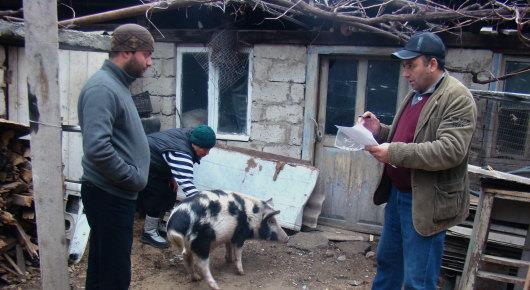Experts join forces to prevent African swine fever from entering the Balkans

Reducing the risk of incursions and improving preparation for the rapid detection and control of African swine fever in the Balkan countries is the main topic of the four-day FAO workshop finishing today in Belgrade.
African swine fever is a viral hemorrhagic disease that kills up to 100 percent of infected animals, both pigs and wild boars. It poses no risks to human health but has the potential to devastate rural livelihoods and jeopardize food security and trade in affected regions.
In recent years, the disease has gradually spread, and its occurrence in Bulgaria, Hungary and Romania in 2019 poses a serious and imminent threat to the Balkans.
“The virus may spread rapidly due to the relatively dense wild boar population and highly prevalent backyard sector,” said Daniel Beltran-Alcrudo, FAO animal health officer.
“Awareness, improved biosecurity and preparedness are key to preventing the disease from entering the region and to minimizing its negative impacts on rural livelihoods, the pig value chain and trade."
“Awareness, prevention and preparedness are key to minimizing the negative impacts of the disease on rural livelihoods, the pig value chain and trade."
Daniel Beltran-Alcrudo
FAO animal health officer
To this end, FAO is implementing an emergency project called “African Swine Fever Emergency Preparedness in the Balkans,” with today’s workshop as a first step in defining prevention and control strategies for the region and to discussing the challenging issues of border control, awareness, biosecurity and others.
The workshop brings together international experts, as well as more than 25 participants from the five recipient countries – Albania, Bosnia and Herzegovina, the Republic of North Macedonia, Montenegro and Serbia – plus Croatia, Hungary and Romania. Participants include representatives from veterinary and forestry agencies and also from hunting associations and non-governmental organizations working with the pig sector. For a disease like African swine fever, coordination among all these institutions is critical. International agencies like the European Food Safety Agency and the World Organisation for Animal Health will also be present.
“The workshop is an extremely important forum for the sharing of knowledge among experts of various fields,” said Daniela Mangione, FAO Program Specialist. “The Balkans were never exposed to African swine fever, which means that governments, farmers and hunters have little awareness and little technical knowledge of the disease.”
As a result of the workshop, representatives will agree on, plan and define activities for the 18-month project and collect detailed information on the key difficulties and challenges for each country concerned.
21 February 2019, Belgrade, Serbia
